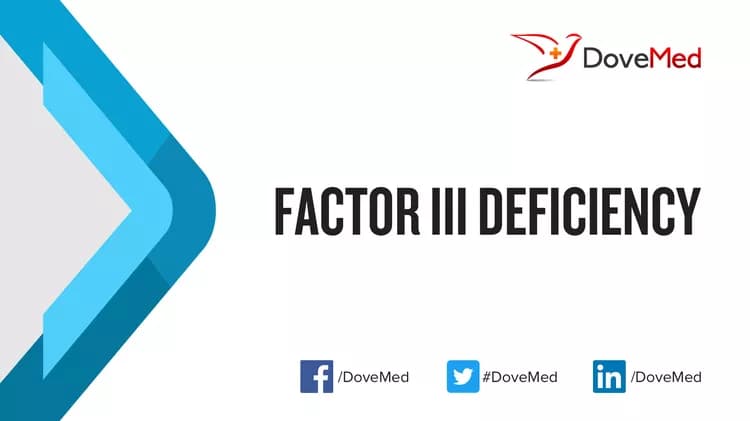What are the other Names for this Condition? (Also known as/Synonyms)
- F3 Coagulation Factor Deficiency
- Thromboplastin Deficiency
- Tissue Factor Deficiency
What is Factor III Deficiency? (Definition/Background Information)
- Factor III Deficiency is the depletion of factor III, also known as F3 coagulation factor, tissue factor, or thromboplastin
- Factor III (F III or factor 3) is one of the 12 clotting factors that are labeled factors I to XIII (factors V and VI actually denote the same clotting factor)
- Clotting factors are proteins that help form blood clots at the site of a blood vessel injury. A blood clot stops further blood loss and allows the blood vessel to continue functioning
- Thus far, there have been no reports of Factor III Deficiency in humans, most likely because of its crucial role in the clotting process
Note: In mice, attempts to generate viable Factor III Deficient progeny have not been successful; the embryos perish in utero.
Additional and Relevant Useful Information for Factor III Deficiency:
The following is the sequence of events that lead to blood clotting:
- The clotting process starts with injury to a blood vessel, which causes it to constrict. Called the vascular phase, this is the first reaction of a blood vessel to damage. Constriction of a blood vessel reduces the flow of blood to the site of injury, which minimizes blood loss
- Next, the circulating platelets clump along the site of blood vessel injury. The platelets form a foundation for a blood clot and release chemicals that stimulate clotting
- The coagulation phase then causes a blood clot to form. Clotting occurs when an enzyme, called thrombin, converts a soluble protein fibrinogen, into its insoluble form, fibrin. Fibrin proteins make up the bulk of a blood clot
- Thrombin is activated by the merging of two pathways, called the intrinsic and extrinsic pathways, into the common pathway. These are initiated by different parts of the body after blood vessel damage:
- The intrinsic pathway begins in blood with the activation of circulating proteins
- The extrinsic pathway begins in the blood vessel with the release of protein factors by damaged cells lining the vessel
- The extrinsic pathway is the first to activate. The intrinsic pathway then reinforces the extrinsic pathway and provides longer-lasting clotting effects
- Factor III is the receptor for coagulation factor VIIa. The binding of factor III to factor VIIa initiates the extrinsic coagulation process, resulting in thrombin formation
Related Articles
Test Your Knowledge
Asked by users
Related Centers
Related Specialties
Related Physicians
Related Procedures
Related Resources
Join DoveHubs
and connect with fellow professionals


0 Comments
Please log in to post a comment.